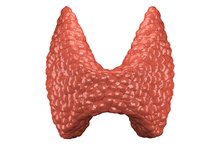Thyroid Problems & Leg Cramps
The thyroid, a small organ that hugs your Adam's apple, is responsible for the metabolism of your body. It takes charge of cellular processes and putting the chemicals in the right places through its own hormones, triiodothyronine (T3) and thyroxine (T4).
Disturbances in the gland's function can cause a variety of symptoms, ranging from weight gain to hair loss and including leg cramping or pain. Leg cramps and pain are tricky symptoms because they're typically associated with muscle trauma.
Thyroid issues tend to be more prevalent in women--roughly 10 percent may have some degree of thyroid hormone deficiency--but men can also face serious problems due to changes in the thyroid gland function.
Describe the pain
In order for your doctor to understand your symptom, be specific. Ask yourself: Where's the leg pain (lower leg or upper leg, at the knee or the ankle or both)? Does it hurt during activity or at rest? Is it a shooting pain, a throbbing pain or a sudden stab of pain in one or many areas?
Take a test
Thyroid Problems & Leg Cramps
Learn More
Your doctor may order a thyroid blood test to measure levels of T3 and T4 and thyroid stimulating hormone (TSH), a hormone made by the pituitary gland that tells the thyroid when to make and secrete T3 and T4. If the thyroid isn't listening to the pituitary, then the levels of TSH may rise or fall to stimulate or suppress the production and secretion of T3 and T4. The blood test is called a serum TSH.
Low levels of hormones may mean hypothyroidism or an "underactive" thyroid--not enough hormones are being secreted. High levels of hormones may mean an "overactive" thyroid--the gland makes too much.
Good news
If your doctor diagnoses you with hypothyroidism, the goal will be to improve thyroid function and hormone levels. Your doctor may prescribe levothyroxine, the most commonly used thyroid medication.
Since the medications help achieve more normal levels of thyroid hormones, the muscles will respond and this may alleviate leg cramping. The medications must be taken regularly even if you feel better and your cramping and pain has disappeared.
Let your doctor know if the cramping does not go away or becomes worse. Also alert her to any side effects or new symptoms. Some medications should not be taken if you have heart problems, so tell your doctor of any family history of heart disease, heart attack or coronary artery disease.
Life after hypothyroidism
Hypothyroid & Flu Symptoms
Learn More
Your doctor may need to change the dosage of your medication. Take your medications daily and keep your doctor informed of any changes in your health. Exercise in short bouts with doable routines. Hypothyroidism may sap your energy, so do what you can. Lower your fat intake. Supplements like calcium and iron may interfere with your medication, so talk to your doctor about when to take them.
Stubborn cramps
If your leg cramps won't go away, your doctor may suggest alternative ways to treat them. Make sure you are drinking enough water. Muscles react to low levels of fluid by tensing up. Stretch your leg muscles gently and regularly. Gentle heat or massage with warm water may help alleviate the toughest of leg cramps.
Related Articles
References
Resources
Writer Bio
Bernadette Sukley's work has been published in "Natural Health," "Sports Illustrated for Women," "Men's Health" and "Swimmer" magazines as well as local magazines and newspapers. She's been fact checking, writing and editing for over 20 years. Sukley specializes in health and lifestyle topics.









